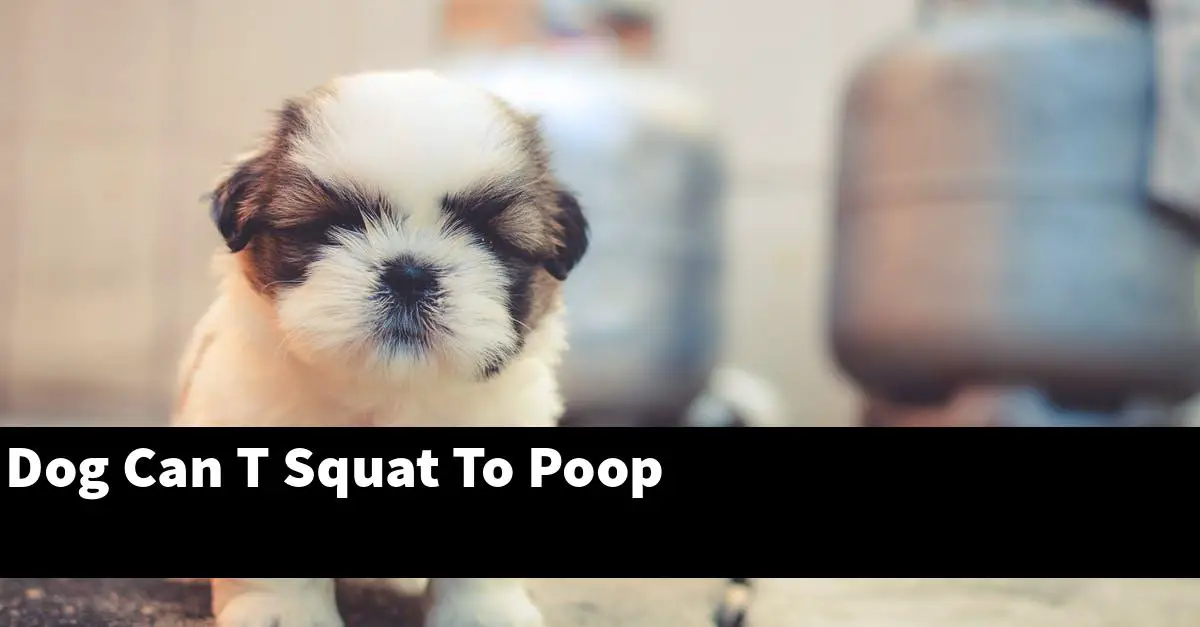Dogs typically squat to defecate, as this position allows them to better cover their feces with soil. However, some dogs may be unable to squat due to musculoskeletal problems or obesity. In these cases, the dog may need to be manually assisted in assume the proper position.
The article is going to be discussing why dogs have a hard time squatting to poop, and how this affects their health.
Table of Contents
Why might a dog have difficulty squatting to defecate?
There are several reasons why a dog might have difficulty squatting to defecate. One reason might be that the dog is not used to the position and needs to be trained to squat. Another reason might be that the dog is uncomfortable in the squatting position due to an injury or medical condition.
What are some possible causes of a dog not being able to squat to relieve themselves?
There are a few reasons why a dog may not be able to squat to relieve themselves. One reason may be that they are in pain. If a dog is in pain, they may not be able to squat properly due to the discomfort. Another reason may be that the dog is obese. An obese dog may not be able to squat properly because of their excess weight. Finally, a dog may not be able to squat properly if they have a neurological condition that affects their balance or movement. If a dog is having difficulty squatting, it is best to consult with a veterinarian to determine the cause.
If a dog is unable to squat to poop, how can owners help them?
There are a few reasons why a dog may be unable to squat to poop. One reason may be that the dog is too obese to squat properly. In this case, the owner will need to help the dog by supporting its hind end while it squats. Another reason a dog may have difficulty squatting is if it has arthritis or another condition that limits its mobility. In this case, the owner may need to provide a stool or other raised surface for the dog to use.
What are some possible long-term effects of a dog not being able to squat to poop?
There are a few possible long-term effects of a dog not being able to squat to poop. One is that the dog may start to experience constipation, as they will not be able to expel all of their waste properly. This could lead to health problems down the road, as waste build-up in the body can lead to toxins being released into the blood stream. Another potential effect is that the dog may start to experience joint pain, as the act of squatting helps to lubricate the joints. Without this regular lubrication, the joints may start to deteriorate and cause pain for the dog.
How can I help my dog squat?
The best way to help your dog squat is to provide them with proper nutrition and exercise. A healthy diet and regular exercise routine will help keep their joints and muscles healthy, which will in turn help them to squat properly. If your dog is having trouble squatting, you may also want to consult with a veterinarian or certified animal physiotherapist to see if there are any other underlying health issues that could be causing the problem.
Why does my dog keep straining to poop?
There are many potential reasons why a dog may strain to poop. Some common causes include constipation, anal gland problems, and intestinal parasites.
Constipation is a common problem in dogs and can be caused by a variety of things, including a lack of fiber in the diet, not enough water intake, or certain medications. If your dog is constipated, you may notice that they strain to poop, have hard stools, or go longer than usual between bowel movements.
Anal gland problems are another common reason why dogs may strain to poop. The anal glands are two small sacs located on either side of the anus that produce a foul-smelling secretion. If these glands become full or infected, they can cause your dog a lot of discomfort. You may notice your dog dragging their butt on the ground or scooting their bottom along the floor.
Intestinal parasites are another possible cause of straining to poop. Parasites such as roundworms and hookworms can cause your dog to have diarrhea or constipation. In some cases, the parasites can also cause your dog to vomit or have a loss of appetite. If you think your dog may have parasites, it is important to take them to the vet for a check-up and treatment.
What to do if my dog can’t get his poop out?
If your dog is having trouble defecating, there are a few things you can do to help. First, make sure that he is drinking plenty of water. Water helps to soften the stool and make it easier to pass. Secondly, you can try feeding your dog a high-fiber diet. Foods like pumpkin or sweet potatoes can help to add bulk to the stool and make it easier to pass. Finally, if your dog is still having trouble, you may need to consult your veterinarian. They can prescribe medication to help soften the stool and make it easier to pass.
Why does my dog squat and walk when he poops?
There are a few reasons why your dog may squat and walk when he poops. One reason could be that he is trying to cover up his waste. This is a natural instinct for dogs, as they are trying to hide their scent from other animals. Another reason could be that your dog is not comfortable pooping in one spot. He may be trying to find a more comfortable spot, or he may be trying to move his waste away from his sleeping area. If your dog is squatting and walking when he poops, it is important to watch him closely to make sure that he is not having any problems with his bowel movements. If you notice that your dog is having difficulty passing stool, or if he seems to be in pain, you should take him to the vet to have him checked out.
Summary
: Dogs may have difficulty squatting to poop for a variety of reasons, including pain, obesity, or neurological conditions. If a dog is having difficulty squatting, it is best to consult with a veterinarian to determine the cause. There are a few things owners can do to help their dog squat, including providing proper nutrition and exercise, and helping to support the dog’s hind end. Some possible long-term effects of a dog not being able to squat to poop include constipation, joint pain, and health problems associated with waste build-up in the body.


